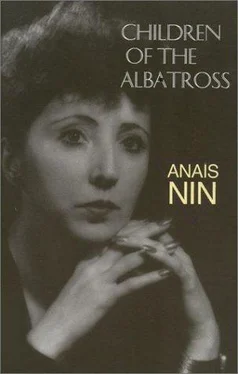Anaïs Nin - Children of the Albatross
Здесь есть возможность читать онлайн «Anaïs Nin - Children of the Albatross» весь текст электронной книги совершенно бесплатно (целиком полную версию без сокращений). В некоторых случаях можно слушать аудио, скачать через торрент в формате fb2 и присутствует краткое содержание. Год выпуска: 1959, ISBN: 1959, Издательство: Swallow Press, Жанр: Классическая проза, Эротические любовные романы, на английском языке. Описание произведения, (предисловие) а так же отзывы посетителей доступны на портале библиотеки ЛибКат.
- Название:Children of the Albatross
- Автор:
- Издательство:Swallow Press
- Жанр:
- Год:1959
- ISBN:9780804000390
- Рейтинг книги:4 / 5. Голосов: 1
-
Избранное:Добавить в избранное
- Отзывы:
-
Ваша оценка:
- 80
- 1
- 2
- 3
- 4
- 5
Children of the Albatross: краткое содержание, описание и аннотация
Предлагаем к чтению аннотацию, описание, краткое содержание или предисловие (зависит от того, что написал сам автор книги «Children of the Albatross»). Если вы не нашли необходимую информацию о книге — напишите в комментариях, мы постараемся отыскать её.
Children of the Albatross — читать онлайн бесплатно полную книгу (весь текст) целиком
Ниже представлен текст книги, разбитый по страницам. Система сохранения места последней прочитанной страницы, позволяет с удобством читать онлайн бесплатно книгу «Children of the Albatross», без необходимости каждый раз заново искать на чём Вы остановились. Поставьте закладку, и сможете в любой момент перейти на страницу, на которой закончили чтение.
Интервал:
Закладка:
She swallowed countless fattening pills, but could only gain a pound or two. When she proudly asked him to note the improvements, his eyes turned away.
One day he said: “I feel your clever head watching me, and you would look down on me if I failed.”
Failed?
She could not understand.
With time, her marriage to another, her dancing which took her to many countries, the image of Michael was effaced.
But she continued to relate to other Michaels in the world. Some part of her being continued to recognize the same gentleness, the same elusiveness, the same mystery.
Michael reappeared under different bodies, guises, and each time she responded to him, discovering each time a little more until she pierced the entire mystery open.
But the same little dance took place each time, a little dance of insolence, a dance which said to the woman: “I dance alone, I will not be possessed by a woman.”
The kind of dance tradition had taught woman as a ritual to provoke aggression! But this dance made by young men before the women left them at a loss for it was not intended to be answered.
Years later she sat at a cafe table in Paris between Michael and Donald.
Why should she be sitting between Michael and Donald?
Why were not all cords cut between herself and Michael when she married and when he gave himself to a succession of Donalds?
When they met in Paris again, he had this need to invent a trinity: to establish a connecting link between Djuna and all the changing, fluctuating Donalds.
As if some element were lacking in his relation to Donald.
Donald had a slender body, like an Egyptian boy. Dark hair wild like that of a child who had been running. At momentshe extreme softness of his gestures made him appear small, at others when he stood stylized and pure in line, erect, he seemed tall and firm.
His eyes were large and entranced, and he talked flowingly like a medium. His eyelids fell heavily over his eyes like a woman’s, with a sweep of the eyelashes. He had a small straight nose, small ears, and strong boyish hands.
When Michael left for cigarettes they looked at each other, and immediately Donald ceased to be a woman. He straightened his body and looked at Djuna unflinchingly.
With her he asserted his strength. Was it her being a woman which challenged his strength? He was now like a grave child in the stage of becoming a man.
With the smile of a conspirator he said: “Michael treats me as if I were a woman or a child. He wants me not to work and to depend on him. He wants to go and live down south in a kind of paradise.”
“And what do you want?”
“I am not sure I love Michael…”
That was exactly what she expected to hear. Always this admission of incompleteness. Always one in flight or the three sitting together, always one complaining or one loving less than the other.
All this accompanied by the most complicated harmonization of expressions Djuna had ever seen. The eyes and mouth of Donald suggesting an excitement familiar to drug addicts, only in Donald it did not derive from any artificial drugs but from the strange flavor he extracted from difficulties, from the maze and detours and unfulfillments of his loves.
In Donald’s eyes shone the fever of futile watches in the night, intrigue, pursuits of the forbidden, all the rhythms and moods unknown to ordinary living. There was a quest for the forbidden and it was this flavor he sought, as well as the strange lighting which fell on all the unknown, the unfamiliar, the tabooed, all that could remind him of those secret moments of childhood when he sought the very experiences most forbidden by the parents.
But when it came to the selection of one, to giving one’s self to one, to an open simplicity and an effort at completeness, some mysterious impulse always intervened and destroyed the relationship. A hatred of permanency, of anything resembling marnage.
Donald was talking against Michael’s paradise as it would destroy the bittersweet, intense flavor he sought.
He bent closer to Djuna, whispering now like a conspirator. It was his conspiracy against simplicity, against Michael’s desire for a peaceful life together.
“If you only knew, Djuna, the first time it happened! I expected the whole world to change its face, be utterly transformed, turned upside down. I expected the room to become inclined,as after an earthquake, to find that the door no longer led to a stairway but into space, and the windows overlooked the sea. Such excitement; such anxiety, and such a fear of not achieving s tlment. At other times I have the feeling that I am escaping a prison, I have a fear of being caught again and punished. When I signal to another like myself in a cafe I have the feeling that we are two prisoners who have found a laborious way to communicate by a secret code. All our messages are colored with the violent colors of danger. What I find in this devious way has a taste like no other object overtly obtained. Like the taste of those dim and secret afternoons of our childhood when we performed forbidden acts with great anxiety and terror of punishment. The exaltation of danger, I’m used to it now, the fever of remorse. This society which condemns me…do you know how I am revenging myself? I am seducing each one of its members slowly, one by one…”
He talked softly and exultantly, choosing the silkiest words, not disguising his dream of triumphing over all those who had dared to forbid certain acts, and certain forms of love.
At the same time when he talked about Michael there came to his face the same expression women have when they have seduced a man, an expression of vain glee, a triumphant, uncontrollable celebration of her power. And so Donald was celebrating the feminine wiles and ruses and charms by which he had made Michael fall so deeply in love with him.
In his flight from woman, it seemed to Djuna, Michael had merely fled to one containing all the minor flaws of women.
Donald stopped talking and there remained in the air the feminine intonations of his voice, chanting and never falling into deeper tones.
Michael was back and sat between them offering cigarettes.
As soon as Michael returned Djuna saw Donald change, become woman again, tantalizing and provocative. She saw Donald’s body dilating into feminine undulations, his face open in all nakedness. His face expressed a dissolution like that of a woman being taken. Everything revealed, glee, the malice, the vanity, the childishness. His gestures like those of a second-rate actress receiving flowers with a batting of the eyelashes, with an oblique glance like the upturned cover of a bedspread, the edge of a petticoat.
He had the stage bird’s turns of the head, the little dance of alertness, the petulance of the mouth pursed for small kisses that do not shatter the being, the flutter and perk of prize birds, all adornment and change, a mockery of the evanescent darts of invitation, the small gestures of alarm and promise made by minor women.
Michael said: “You two resemble each other. I am sure Donald’s suits would fit you, Djuna.”
“But Donald is more truthful,” said Djuna, thinking how openly Donald betrayed that he did not love Michael, whereas she might have sought a hundred oblique routes to soften this truth.
“Donald is more truthful because he loves less,” said Michael.
Warmth in the air. The spring foliage shivering out of pure coquetry, not out of discomfort. Love flowing now between the three, shared, transmitted, contagious, as if Michael were at last free to love Djuna in the form of a boy, through the body of Donald to reach Djuna whom he could never touch directly, and Djuna through the body of Donald reached Michael—and the missing dimension of their love accomplished in space like an algebra of imperfection, an abstract drama of incompleteness at last resolved for one moment by this trinity of woman sitting between two incomplete men.
Читать дальшеИнтервал:
Закладка:
Похожие книги на «Children of the Albatross»
Представляем Вашему вниманию похожие книги на «Children of the Albatross» списком для выбора. Мы отобрали схожую по названию и смыслу литературу в надежде предоставить читателям больше вариантов отыскать новые, интересные, ещё непрочитанные произведения.
Обсуждение, отзывы о книге «Children of the Albatross» и просто собственные мнения читателей. Оставьте ваши комментарии, напишите, что Вы думаете о произведении, его смысле или главных героях. Укажите что конкретно понравилось, а что нет, и почему Вы так считаете.












